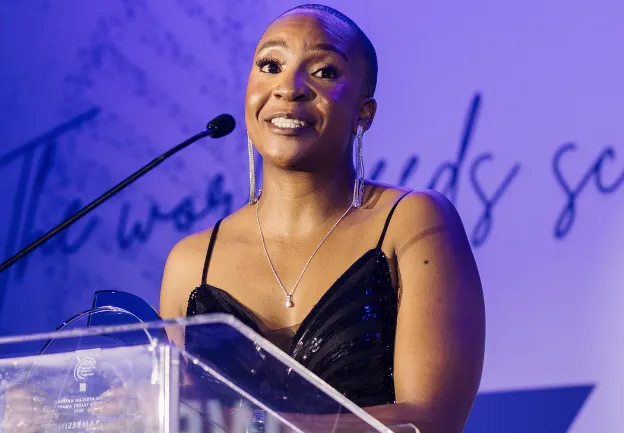Stellenbosch University researcher receives prestigious L’Oréal-UNESCO award

Dr Bambesiwe May, a postdoctoral fellow at the African Rainbow Minerals Chair in Geometallurgy in SU’s department of earth sciences, has been named one of eight recipients of the L’Oréal-UNESCO For Women in Science National Programme Awards.
Image: Supplied
A Stellenbosch University (SU) researcher is turning mining waste from an environmental threat into a sustainable opportunity, and her work has earned her one of the country’s top scientific honours.
Dr Bambesiwe May, a postdoctoral fellow at the African Rainbow Minerals Chair in Geometallurgy at the university’s department of earth sciences, has been named one of eight recipients of the 2025 L’Oréal-UNESCO For Women in Science National Programme awards.
The awards ceremony, recently held in Johannesburg, celebrated South African women whose research is helping to solve some of Africa’s most pressing challenges.
“I was excited, grateful, and honestly just overwhelmed with joy. It felt like a ‘finally’ moment, like all the quiet seasons of persistence had found their recognition. It was an amazing feeling, both grounding and surreal at the same time,” she said.
The L’Oréal-UNESCO programme seeks to close the gender gap in science by recognising and funding women who are advancing research and innovation in South Africa.
Dr May’s research focuses on profiling and rethinking mining waste. Her framework combines environmental risk management with resource recovery, identifying materials that can be reused safely and those that must be contained.
She is currently applying the model to manganese and gold tailings (the leftover waste materials from mining after manganese or gold has been extracted from the ore) in Southern Africa, to transform mining waste into a valuable resource.
“I worked as a geochemist in environmental consulting, where we constantly dealt with mine waste assessments. I often found myself wondering, ‘What if we could do more than just classify waste? What if we could rethink it?’ That curiosity led me back to academia, driven by a desire to create practical, science-based solutions that protect nature and make industry more sustainable,” she said.
She said she hopes her achievement inspires other young women to pursue careers in science.
With the support of her L’Oréal-UNESCO award, Dr May will now pilot her Environmental Geochemical Assessment-Valorisation Framework across new waste streams — including transforming water hyacinth into paper and textile waste into eco-friendly tiles.
The aim, she said, is to demonstrate how waste can be reclassified as a resource while protecting the environment.
Serge Sacre, the chief executive of L’Oréal South Africa, said: “When women scientists are empowered, their innovations ripple through communities, economies, and ecosystems. These awards not only honour their achievements but ensure their voices continue to inspire long after the spotlight fades.”
The deputy minister of science, technology and innovation, Dr Nomalungelo Gina, said empowering women in science is essential for equitable growth and lasting innovation.
Related Topics: